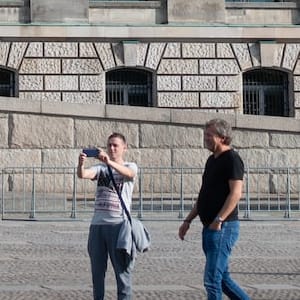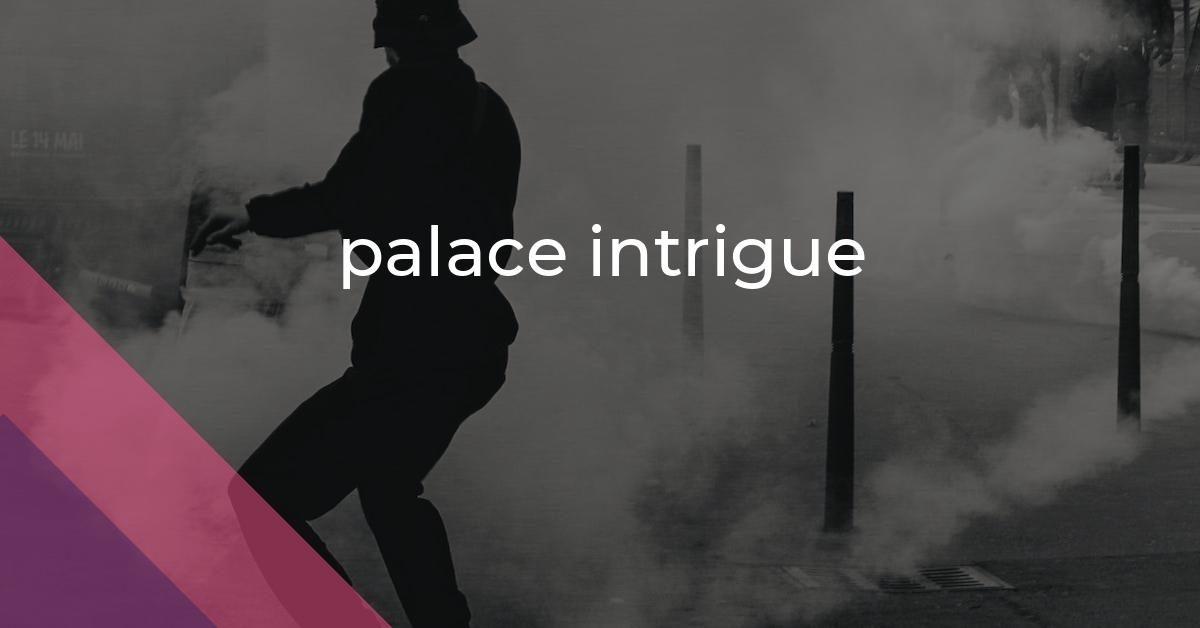palace intrigue: Idiom Meaning and Origin
What does ‘palace intrigue’ mean?
Palace intrigue refers to secretive and often scandalous plotting and scheming that occurs within the confines of a royal or political establishment.

Idiom Explorer
The idiom "rose garden" metaphorically refers to a situation or place that appears pleasant and peaceful, but is, in reality, filled with hidden dangers or difficulties.
The idiom "riddle wrapped in an enigma" means something or someone that is difficult to understand or explain because of their mysterious or complex nature.
A primrose path refers to a tempting and pleasurable route that ultimately leads to disaster or ruin.
When someone prevails upon another, they successfully persuade or convince them to do something, often through persistent effort or pleading.
The idiom "pray tell" is used to politely ask someone to provide information or share a secret or surprising fact.
The idiom "powers that be" refers to the influential individuals or groups who hold authority or control over a particular situation or organization.
The idiom "power behind the throne" refers to a person who holds significant influence and control over a situation or an organization without having an official title or position of authority. This individual often pulls the strings and makes key decisions behind the scenes, while someone else holds the visible position of power.
Polite fiction refers to a socially acceptable but false statement or belief used to maintain harmony or avoid conflict in a conversation or situation.
Uncovering Intricate Scheming
Palace intrigue is an idiom frequently used to describe secretive and manipulative behavior, often within political or royal circles. The idiom originated from the word "palace," referring to a royal residence, and "intrigue," which denotes a secretive and often complex plot or conspiracy. This phrase has been in use for centuries and has become deeply ingrained in the English language.
The term "palace intrigue" has its origins in the political and royal courts of Europe during the Renaissance and later periods. These palaces served as not only residences for the ruling elite but also as centers of power and political maneuvering. It was within the palace walls that a complex web of relationships, alliances, and power struggles played out, giving rise to the idiom "palace intrigue."
Palace intrigue involves secretive tactics, manipulation, and behind-the-scenes plotting to gain or maintain power or influence. It is characterized by clandestine meetings, whispered conversations, and the spreading of rumors or misinformation. This idiom is often associated with treachery, betrayal, and double-crossing, as individuals within the palace may pursue their own agendas at the expense of others.
Furthermore, palace intrigue extends beyond its historical context and is now used more broadly to describe similar behaviors in various settings. It can be observed in corporate environments, social circles, and even everyday situations. The idiom has become a metaphor for the complexities and power dynamics inherent in human relationships, particularly those involving influence, ambition, and hidden motivations.
The use of "palace politics" as an idiom is closely related to palace intrigue. It refers to the power struggles, manipulation, and behind-the-scenes machinations within a political system. Just as palace intrigue encompasses the secretive and manipulative behavior in royal circles, palace politics describes similar tactics used in the political arena.
"play politics" is another related idiom that reflects the concept of palace intrigue. It refers to engaging in cunning and manipulative behavior to gain advantage or control in a given situation. This idiom conveys the idea of individuals strategizing and maneuvering to achieve their goals, often at the expense of others.
Another idiom related to palace intrigue is "power behind the throne." It refers to an individual or group of individuals who exercise significant influence and control over a leader or ruler, while remaining unseen or less visible to the public eye. This idiom captures the idea of someone wielding power from the shadows, manipulating events and decisions to serve their own interests.
Modern usage of the idiom "palace intrigue" often evokes a sense of fascination and curiosity about the inner workings of powerful institutions or individuals. It captures the allure of power struggles, secrets, and hidden agendas, which are often magnified and romanticized in popular culture. However, the phrase also carries a cautionary connotation, warning against the dangers of unchecked ambition and the potential harm that can arise from deceitful tactics.
"palace intrigue" is an idiom that encapsulates the secretive and manipulative behavior often observed in political and royal circles. Its origins can be traced back to the complex power dynamics within historical palaces. With its metaphorical use in contemporary contexts, it offers insights into the complexities of human relationships and the allure of power struggles. While the idiom may always evoke a sense of fascination, it also serves as a reminder of the potential dangers of unchecked ambition and deceitful tactics.
Example usage
Examples:
- The upcoming elections are filled with palace intrigue as different parties scheme and plot to gain power.
- The royal family is no stranger to palace intrigue, with rumors of affairs, secret alliances, and behind-the-scenes maneuvering.
- In the world of high finance, there is often palace intrigue as executives jockey for positions and engage in power struggles within companies.
The idiom "palace intrigue" refers to the complex, secretive, and often treacherous politics and power struggles that occur within the walls of a palace or any powerful organization. It implies a sense of behind-the-scenes manipulation, covert scheming, and hidden agendas.
In the first example, the phrase is used metaphorically to describe the political maneuvering and plotting that takes place during elections. It suggests a highly competitive and secretive political environment.
The second example portrays the royal family as a setting synonymous with palace intrigue, indicating that their public image of grace and elegance hides a web of secret affairs, alliances, and power struggles.
In the last example, the phrase is applied to the world of high finance, highlighting the cutthroat nature of corporate politics in which executives engage in power struggles and employ manipulative tactics to secure their positions.
Overall, "palace intrigue" is used to describe situations where there is an undercurrent of secrecy, plotting, and power games, often in relatively closed and powerful circles.
More "Intrigue" idioms



